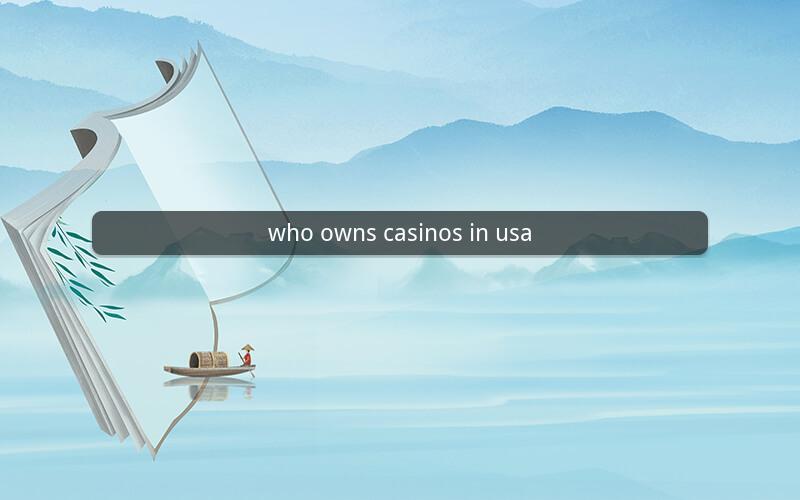
Table of Contents
1. Introduction to Casino Ownership in the USA
2. Historical Overview of Casino Ownership
3. Major Casino Ownership Groups in the USA
3.1 Native American Tribes
3.2 Private Companies
3.3 International Corporations
4. Legal Framework Governing Casino Ownership
5. Economic Impact of Casino Ownership
6. Challenges and Controversies Surrounding Casino Ownership
7. Future Trends in Casino Ownership
1. Introduction to Casino Ownership in the USA
Casino ownership in the USA is a multifaceted industry, encompassing a wide range of entities from Native American tribes to private companies and international corporations. The history of casino ownership in the USA is marked by significant changes in legal and regulatory frameworks, which have shaped the current landscape of the industry.
2. Historical Overview of Casino Ownership
The first legal casino in the USA was established in Nevada in 1931. Since then, the industry has grown exponentially, with casinos becoming a significant source of revenue for both state and local governments. The early years of casino ownership were dominated by organized crime, but over time, regulations and oversight have led to a more diversified ownership structure.
3. Major Casino Ownership Groups in the USA
3.1 Native American Tribes
Native American tribes have become one of the most prominent casino ownership groups in the USA. Through the Indian Gaming Regulatory Act of 1988, tribes were granted the right to operate casinos on their land, leading to a significant expansion of the industry. Some of the largest casino properties in the country are owned by Native American tribes, such as the WinStar World Casino and Resort in Oklahoma and the Foxwoods Resort Casino in Connecticut.
3.2 Private Companies
Private companies also play a significant role in casino ownership. These companies often operate on a regional or national scale and include some of the most recognizable names in the industry, such as MGM Resorts International, Caesars Entertainment, and Wynn Resorts. These companies own and operate a variety of casino properties, from luxury resorts to local casinos.
3.3 International Corporations
International corporations have also entered the US casino market, bringing with them a wealth of experience and resources. Companies like Las Vegas Sands Corporation, which is led by Sheldon Adelson, and Melco Resorts & Entertainment have made significant investments in the US market, particularly in Las Vegas.
4. Legal Framework Governing Casino Ownership
The legal framework governing casino ownership in the USA is complex and includes federal, state, and tribal laws. The Federal Bureau of Investigation (FBI) and the National Indian Gaming Commission (NIGC) are responsible for enforcing these laws and ensuring compliance with regulations. The legal framework also includes anti-money laundering (AML) and anti-terrorism financing (ATF) measures to prevent illegal activities in the industry.
5. Economic Impact of Casino Ownership
Casino ownership has a significant economic impact on the USA. Casinos generate billions of dollars in revenue each year, creating jobs and contributing to local and state economies. The industry also attracts tourists from around the world, further boosting the economy.
6. Challenges and Controversies Surrounding Casino Ownership
Despite the economic benefits, casino ownership is not without its challenges and controversies. Issues such as gambling addiction, the impact on local communities, and the potential for corruption have raised concerns about the industry. Additionally, the competition between different ownership groups has led to disputes and legal battles.
7. Future Trends in Casino Ownership
The future of casino ownership in the USA is likely to be shaped by technological advancements, changing consumer preferences, and evolving legal and regulatory frameworks. Online gambling and mobile gaming are expected to play a larger role in the industry, and there may be increased scrutiny on the environmental and social impacts of casino development.
---
10 Questions and Answers about Casino Ownership in the USA
Q1: What is the most significant legal change in casino ownership history?
A1: The Indian Gaming Regulatory Act of 1988, which allowed Native American tribes to operate casinos on their land, was a pivotal legal change in casino ownership history.
Q2: Which Native American tribe operates the largest casino in the USA?
A2: The WinStar World Casino and Resort, owned by the Chickasaw Nation, is one of the largest casinos in the USA.
Q3: What is the primary legal body responsible for regulating casino ownership in the USA?
A3: The National Indian Gaming Commission (NIGC) is the primary federal regulatory body for casino ownership in the USA.
Q4: How has the economic impact of casino ownership changed over the years?
A4: The economic impact of casino ownership has grown significantly over the years, with casinos becoming a major source of revenue and employment.
Q5: What are some of the challenges faced by casino ownership groups?
A5: Challenges include gambling addiction, community impact, and potential for corruption, as well as intense competition within the industry.
Q6: How are online gambling and mobile gaming impacting casino ownership?
A6: Online gambling and mobile gaming are expected to increase competition and potentially reshape the traditional casino industry.
Q7: What role do international corporations play in the US casino market?
A7: International corporations, such as Las Vegas Sands and Melco Resorts, bring significant investment and experience to the US casino market.
Q8: How do private companies and Native American tribes compare in terms of casino ownership?
A8: Private companies and Native American tribes both play significant roles in casino ownership, with tribes often operating larger and more diverse properties.
Q9: What are some of the environmental concerns associated with casino development?
A9: Environmental concerns include water usage, energy consumption, and the impact on local ecosystems.
Q10: How is the legal framework for casino ownership expected to evolve in the future?
A10: The legal framework is expected to evolve with technological advancements and increased focus on social and environmental impacts, potentially leading to more stringent regulations.